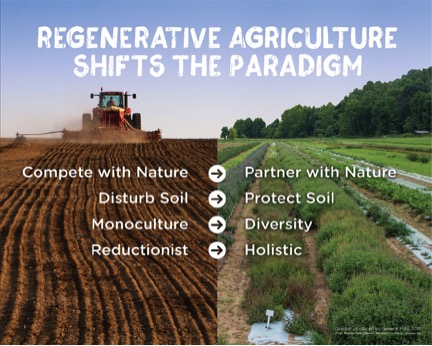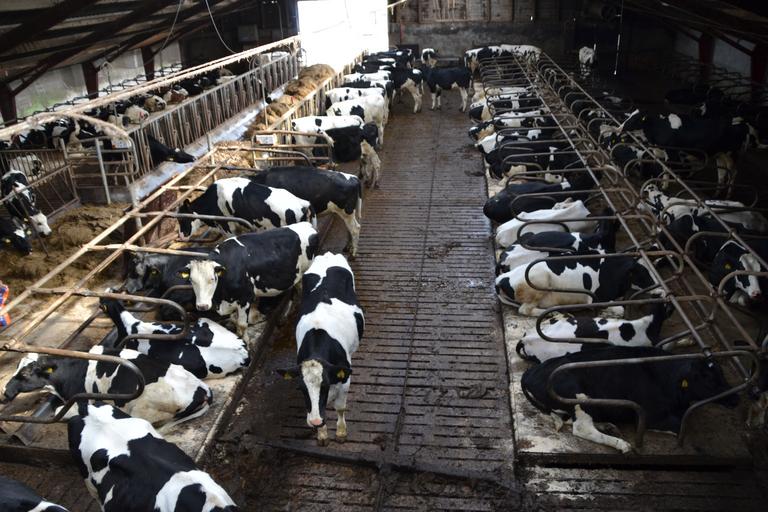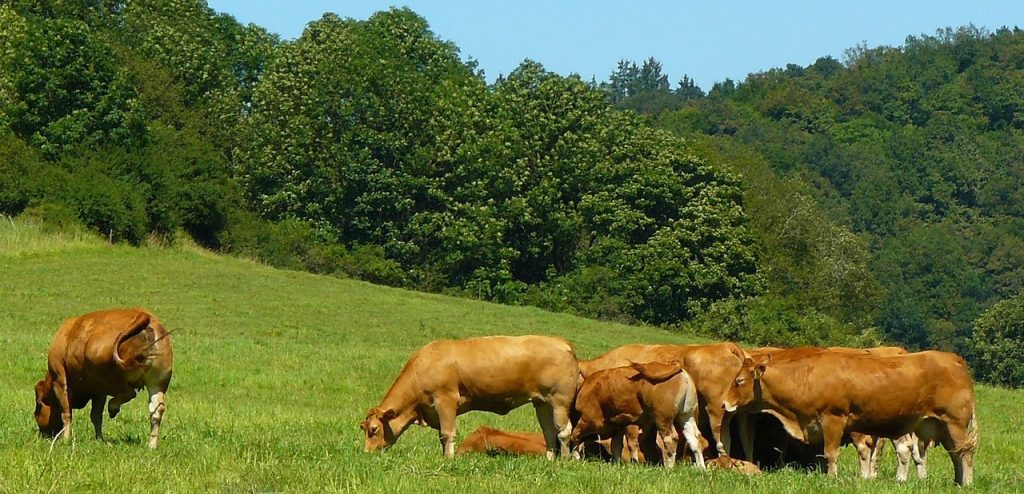
It’s time to stop ignoring the obvious. Climate change is now an emergency for humanity.
One way to stop runaway climate is to change farming practices that damage ecosystems and biodiversity. Rodale Institute research proves regenerative agriculture has the potential to reverse climate change by sequestering more than 100% of current CO2 levels.
Rising CO2 levels are a symptom of ecosystem and biodiversity degradation. Conventional agricultural practices harm ecosystems and biodiversity. Transitioning to a different way of farming is essential to repair the damage.
A better way to grow food and support ecosystems is a method called regenerative agriculture. Regenerative agriculture is a holistic land management practice using farming principles that mimic nature.

Regenerative farming benefits
Regenerative farming and grazing practices create and maintain healthy soil. Healthy soil absorbs CO2 from the atmosphere and is more resilient against droughts and floods. That’s a real plus in today’s increasingly severe weather.
Regenerative agriculture has the following benefits:
- stores CO2 in the soil
- improves soil health by increasing organic matter
- increases soil organism diversity
- increases soil water holding capacity
- prevents soil loss
- increases soil nutrients
- increases crop resilience
- restores biodiversity
- provides climate change resilience
Drawbacks of conventional agriculture
Conventional agricultural practices of tilling, monoculture, chemical pesticides, and chemical fertilizers cause damage to soil. These harmful practices result in CO2 release, water runoff, soil loss, and destruction of soil organisms.
Synthetic fertilizers contribute to climate change by leaking into ground water and atmosphere, disrupting soil organisms, adding excessive nutrients to soil, and accelerating decomposition of soil organic matter. Energy used in synthetic fertilizer production and transportation also add to climate change.
An ecosystem modified for agricultural use is called an agrosystem. Synthetic fertilizers create an agroecosystem dependent on artificial materials, which negatively affects natural uptake of plant nutrients. The result is weaker, less resilient plants.
Benefits of Regenerative Practices
No-till or minimum soil tillage improves water infiltration and retention, CO2 storage ability, and soil stability. Stable soil resists damage from tillage, exposure to water and wind erosion, and shrinking and swelling caused by changing weather conditions.
Cover crops, crop rotation, compost and animal manures restore soil fertility. These practices reestablish soil organisms necessary for release, transfer, and uptake of essential soil nutrients.
Ecosystem diversity is improved by using composted materials, intercrop plantings, multiple cover crop species, and borders planted for bee habitat and other beneficial insects.
When addressing climate change by changing farming practices, plant growing methods are not the only concern. We also need to consider the handling of farm animals.
Farm Animal Care

Conventional feed lots and confined animal feeding systems contribute greatly to CO2 and methane emissions, unhealthy monoculture systems, forage low in nutrients, increased water pollution, and excessive antibiotic use and resistance. The result is an ecosystem-degrading food production system.

Regenerative grazing practices improve plant growth and soil fertility, increase insect and plant biodiversity, and improve pasture and grazing land. These practices enhance animal, ecosystem and consumer health by improving micronutrient availability and dietary omega fats balance.
What you can do
You don’t have to own a farm to use this information. If you have a vegetable garden, use principles of regenerative farming practices in your own backyard. By not tilling, using compost and cover crops instead of synthetic fertilizers, planting a variety of veggies, and forgoing pesticides, you will contribute to reversing climate change. If you can’t plant a vegetable garden, buy food from a local organic farmer.
Would you like to learn more? Consult your local Penn State Master Gardener program.
Further Reading:
Regenerative Agriculture Initiative, California State University, Chico
17 Organizations Promoting Regenerative Agriculture Around the Globe
Regenerative Organic Farming: A Solution to Global Warming
Or check out the new Kiss The Ground video, an excellent review of the issues. It’s about an hour long and is currently streaming on Netflix or can be seen on Vimeo for $1.

Leave a Reply